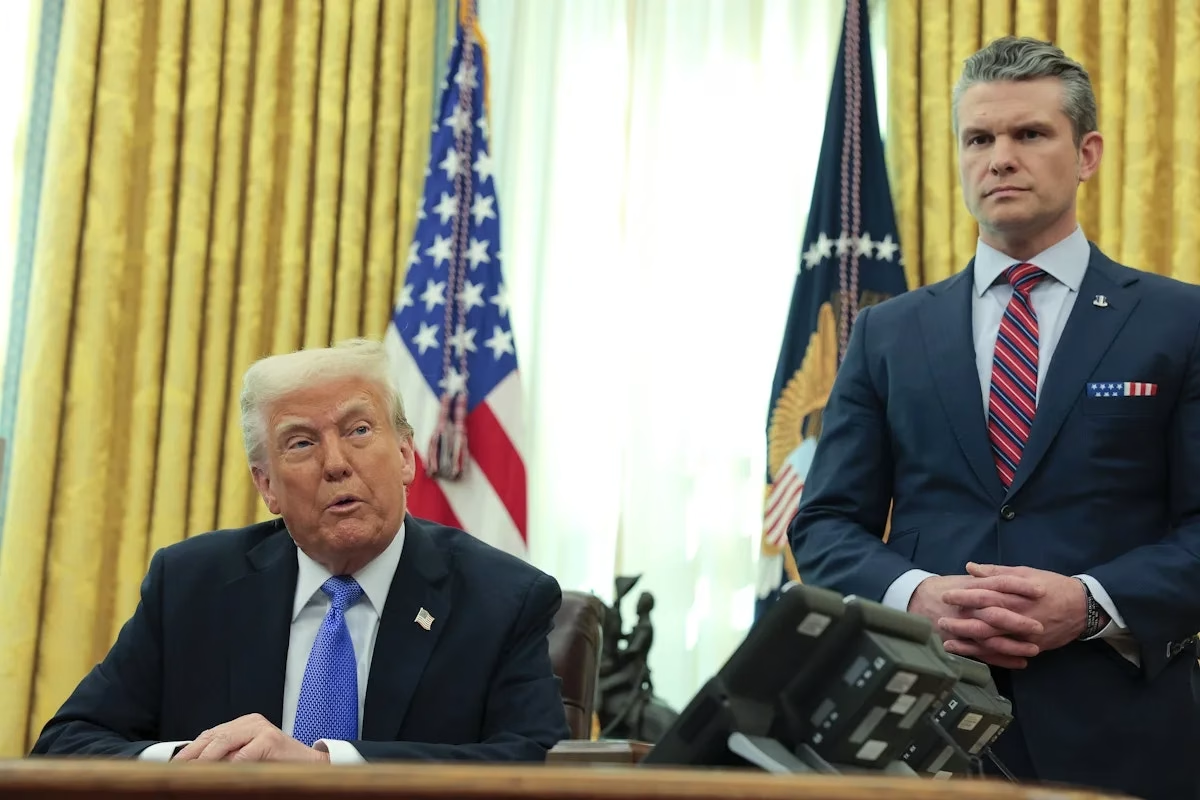By Don Terry & Mary Jones | Saturday, March 22, 2025 | 5 min read
Elon Musk, the billionaire behind Tesla and SpaceX, reportedly attended a high-level meeting at the Pentagon on Friday, where he was briefed on some of the U.S. government’s most sensitive military strategies related to China. The news, first reported by The New York Times and The Wall Street Journal, has sparked intense speculation about the motivations behind such an unusual move. Is this an effort to safeguard Tesla’s growing interests in China, or is it a broader strategic play in the complex game of U.S.-China diplomacy?
Defense Secretary Pete Hegseth took to X to clarify the nature of Elon Musk’s visit to the Pentagon. “We look forward to welcoming @elonmusk to the Pentagon tomorrow,” he posted. “But the fake news delivers again—this is NOT a meeting about ‘top secret China war plans.’ It’s an informal discussion about innovation, efficiencies, and smarter production. Gonna be great!”
Musk, who owns X, also chimed in, dismissing The New York Times report as “pure propaganda.” He added, “I look forward to the prosecutions of those at the Pentagon who are leaking maliciously false information to NYT. They will be found.”
The briefing, according to a U.S. official who spoke on the condition of anonymity, took place in a secure meeting room typically reserved for the Joint Chiefs, informally known as “the tank.” The official also revealed that Adm. Samuel Paparo, head of U.S. Indo-Pacific Command—which oversees operations related to China—was expected to join the discussion virtually from Sri Lanka.
Pentagon officials emphasized that while the briefing would touch on China, it would only include unclassified information. This clarification seems aimed at downplaying the sensationalized narrative of Musk being privy to top-secret war plans, instead framing the meeting as a collaborative effort to explore innovation and efficiency in defense production.
The back-and-forth highlights the tension between Musk’s high-profile role in both the private sector and national security discussions, as well as the ongoing scrutiny of how his companies, like Tesla and SpaceX, intersect with U.S. strategic interests. While the Pentagon insists the meeting is routine and focused on broader goals, the speculation surrounding it underscores the blurred lines between corporate influence and government decision-making in an increasingly complex geopolitical landscape.
The briefing, which would grant Musk access to sensitive military information unavailable to most business leaders, raises questions about the intersection of corporate interests and national security. Tesla, which relies heavily on China for both manufacturing and market share, has become a key player in the global electric vehicle industry. At the same time, SpaceX, Musk’s aerospace company, is a significant defense contractor for the U.S. government. This dual role places Musk in a unique position—one where his companies’ success is deeply intertwined with geopolitical tensions.
According to The Wall Street Journal, Musk requested the briefing himself, citing a need to understand aspects of the Pentagon’s war plans to ensure his companies’ operations align with national security priorities. However, the timing and nature of the briefing have led some to wonder if there’s more to the story. Could this be a calculated move to protect Tesla’s interests in China, where the company has invested billions in a Shanghai Gigafactory and relies on the Chinese market for a significant portion of its revenue?
The Times pointed out that the reasoning behind such a highly sensitive briefing remains murky. While Musk’s position as a defense contractor could explain some level of access to classified information, the involvement of Tesla introduces a more complicated dynamic. China isn’t just a vital market for Tesla—it’s also a key geopolitical adversary of the United States. If tensions between the two nations were to escalate, Tesla’s operations in China could face serious risks.
Some observers speculate that bringing Musk into discussions about potential conflict with China might serve as a strategic signal to Beijing: targeting Tesla could come with significant consequences. By positioning Musk at the forefront of these high-stakes conversations, the U.S. may be sending a subtle but clear message—don’t disrupt Tesla’s interests, or face broader repercussions. This move could be less about Musk’s role as a defense contractor and more about using his high-profile status to protect Tesla’s foothold in China, a country where the company has invested heavily and relies on for a substantial portion of its revenue.
The situation underscores the delicate balance between corporate interests and national security, raising questions about how far governments should go to shield private enterprises in an increasingly interconnected—and tense—global landscape.
Meanwhile, President Donald Trump took to social media to downplay the situation, stating that “China will not even be mentioned or discussed” during the meeting. This conflicting narrative only adds to the intrigue.
Critics argue that granting Musk access to top-secret military plans blurs the line between corporate interests and national security. If the briefing is indeed aimed at protecting Tesla’s stake in China, it could set a troubling precedent for other U.S. companies operating in sensitive regions. On the other hand, supporters see it as a pragmatic approach to leveraging Musk’s expertise and resources in the face of growing geopolitical challenges.
The broader question is whether this move is about safeguarding Tesla or advancing U.S. strategic interests. Musk’s companies are at the forefront of two critical industries—electric vehicles and space exploration—both of which have significant implications for national security and economic dominance. By involving Musk in high-level discussions, the Pentagon may be seeking to align his innovative capabilities with its strategic goals.
Ultimately, the briefing highlights the increasingly complex relationship between technology, business, and geopolitics. Whether it’s a genuine effort to protect Tesla’s interests or a strategic maneuver in the U.S.-China rivalry, one thing is clear: Elon Musk’s influence extends far beyond the boardroom, shaping not just industries but the future of global power dynamics.
As the lines between corporate and national interests continue to blur, the world will be watching to see how this unprecedented collaboration unfolds—and what it means for the future of diplomacy, innovation, and global security.
Copyright 2025 FN, NewsRoom.





